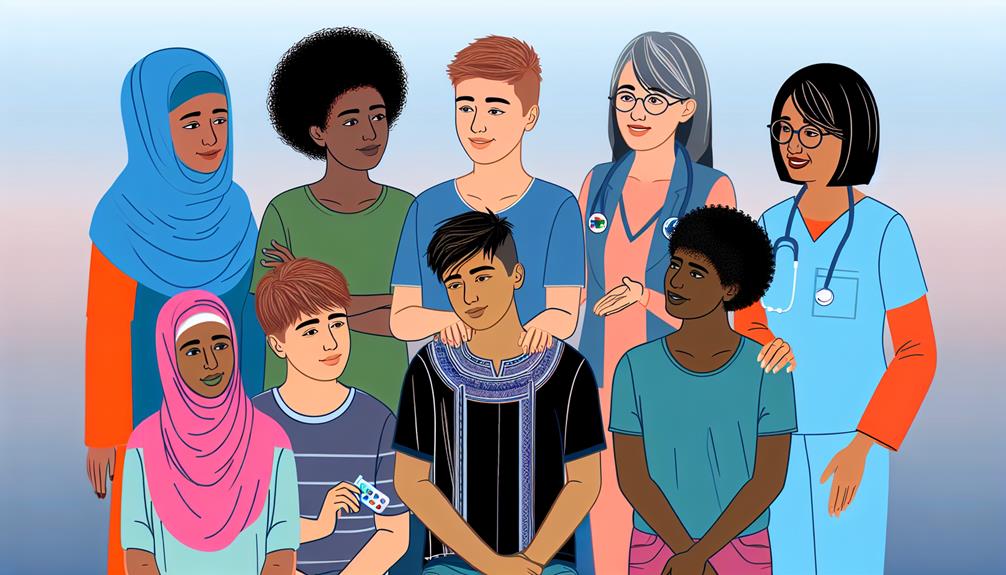Have you ever wondered what the best substance abuse treatment programs for adolescents are?
When it comes to helping young individuals overcome addiction, there are several effective options available. From residential treatment programs that provide a supportive and structured environment to intensive outpatient programs that offer flexibility and continued support, the choices can be overwhelming.
And that's not all – there are also medication-assisted treatment programs and dual diagnosis treatment programs specifically designed to address the unique needs of adolescents struggling with substance abuse.
So, which ones are the best? Stay tuned as we explore the top four substance abuse treatment programs for adolescents, providing you with valuable insights to help you make an informed decision for yourself or a loved one.
Residential Treatment Program

If you have a teenager struggling with substance abuse, a residential treatment program can provide them with a supportive and structured environment for recovery. It's understandable that as a parent, seeing your teenager go through such a challenging time can be overwhelming. However, by enrolling them in a residential treatment program, you're taking a proactive step towards their well-being. These programs are designed to offer a comprehensive approach to treatment, combining therapy, education, and support.
One of the key benefits of a residential treatment program is the involvement of the family. Recognizing that substance abuse affects not only the individual but also their loved ones, these programs aim to include the family in the recovery process. Through family therapy sessions and educational workshops, you'll learn how to support your teenager during their journey towards sobriety.
Additionally, residential treatment programs provide aftercare support to ensure a successful transition back into everyday life. This may include outpatient therapy, support groups, and relapse prevention strategies. By having access to ongoing support, your teenager will have the tools and resources they need to maintain their sobriety long after leaving the program.
Intensive Outpatient Program
To continue your teenager's journey towards recovery, an intensive outpatient program offers a flexible and comprehensive approach to substance abuse treatment while allowing them to maintain their daily routines. Family involvement is a crucial aspect of this program, as it recognizes the importance of a strong support system in the recovery process. Your teenager will have the opportunity to attend therapy sessions and participate in group activities that involve the family. By involving the family, the program aims to strengthen relationships and create a supportive environment at home, which is essential for long-term recovery.
Cognitive-behavioral therapy (CBT) is a cornerstone of the intensive outpatient program. Through CBT, your teenager will learn to identify negative thought patterns and behaviors that contribute to substance abuse. They'll be guided in developing healthier coping mechanisms and strategies to manage cravings and triggers. This therapy approach is highly effective in helping adolescents gain insight into their substance abuse and develop the skills needed to make positive changes.
The intensive outpatient program recognizes that every teenager is unique, so treatment plans are tailored to meet their specific needs. The program provides a combination of individual therapy, group therapy, and educational sessions to address various aspects of substance abuse. By participating in this program, your teenager will receive the support, guidance, and tools necessary to overcome their addiction and build a healthier future.
Medication-Assisted Treatment

Medication-Assisted Treatment can be a valuable tool in supporting your teenager's journey towards recovery from substance abuse. When it comes to treating substance abuse in adolescents, medication-assisted treatment has shown promising results. Research has indicated the efficacy of medication-assisted treatment in reducing cravings and withdrawal symptoms, as well as improving overall treatment outcomes.
Medication-assisted treatment typically involves the use of medications such as buprenorphine or methadone for opioid addiction, or medications like naltrexone for alcohol or opioid use disorders. These medications help to stabilize brain chemistry, reduce cravings, and alleviate withdrawal symptoms, allowing your teenager to focus on their recovery.
However, it's important to note that like any medication, there can be potential side effects. These side effects vary depending on the medication used, but common ones may include nausea, dizziness, drowsiness, or constipation. It's crucial to work closely with a healthcare professional who specializes in adolescent substance abuse treatment to monitor your teenager's progress and manage any side effects that may arise.
Dual Diagnosis Treatment
When it comes to addressing the complex needs of adolescents struggling with substance abuse, an important treatment approach to consider is dual diagnosis treatment. Adolescents with substance abuse issues often have co-occurring mental health disorders, such as depression, anxiety, or attention-deficit/hyperactivity disorder (ADHD). Dual diagnosis treatment focuses on simultaneously addressing both the substance abuse and the underlying mental health issues.
Treating co-occurring disorders requires a comprehensive and integrated approach. Therapeutic approaches for dual diagnosis involve a combination of medication, individual and group therapy, family therapy, and support groups. Medication can help manage symptoms of mental health disorders, while therapy provides a safe space for adolescents to explore their thoughts and feelings. Family therapy is crucial in addressing family dynamics that may contribute to substance abuse, and support groups offer an opportunity for adolescents to connect with peers who are facing similar challenges.
Dual diagnosis treatment recognizes that substance abuse and mental health disorders are interconnected and can't be effectively treated in isolation. By providing adolescents with the tools and support they need to address both aspects of their well-being, dual diagnosis treatment offers a holistic and effective approach to their recovery journey.

